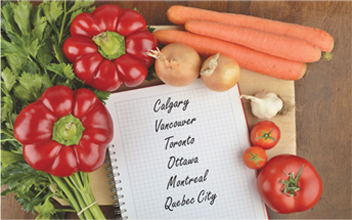Montreal & Quebec City, Quebec
The eastern side of Canada is home to the province of Quebec, the heavily French side of the country and the cities of Montreal and Quebec City. Bricker describes Quebec City as rather non-multicultural, and instead as “very French” and the “epicenter of French culture.”
Although Quebec City is comparatively small with less than a million residents, it is the only walled city in North America. Bricker calls it “arguably the most beautiful city in Canada—very historic and famous for its winter carnival—a real treat.”
Neighboring Montreal is the second-most populous city in Canada with nearly 4 million residents as of 2013. Johnny Borsellino, president of Montreal-based Fruit Dome, Inc. describes the city as being “very diversified and rich in culture”—which includes a huge variety of restaurants and cafés with some estimating it would take almost ten years to try every eatery in the city.
“Anything you want to try, there are always new restaurants opening up,” Borsellino observes. “It’s a pretty fast moving city—different groups of people, different types of restaurants. Some succeed, most don’t. The standards have become so high,” he explains, “for a restaurant to succeed, both great food and ambiance have to be there.”
Along with restaurants, Borsellino says the city has an especially large number of grocery stores. “Quebecers and Europeans in general don’t mind spending on eating well.” Fruit Dome, which sells fresh herbs, has seen an increase in its organic selections. “Our conventionals have always done well, but our organic line has been increasing month to month.” Demand for organics, he finds, usually depends on demographics and location. “Some stores have a full organic line,” he says, others where income level is lower may stock higher-end products such as organics but offer more promotions or deals.
From an industry perspective, Borsellino describes Montreal as being a tight market and hard for newcomers to break into. “The companies that do well in Montreal have been established 30-plus years. It’s very difficult to get listed or become accepted with chains or retail stores and to get support of wholesalers. In summertime, wholesalers and farmers support local growers; if you’re coming in as a foreigner, you’re losing a few months of business to local supply.”
Additionally, Borsellino explains, “Everybody kind of specializes in their own product. For example, a wholesaler will have two suppliers, not ten, and he works with them. He won’t risk losing a supplier because somebody new comes in. People are quite loyal.” His advice to newcomers is to start small, appreciate any and all business by giving exemplary service, quality of product, and good pricing. “Price will always be a factor; give the best product to get recognized as a solid company, not a fly-by-night. It’s a little jungle here in Montreal, especially in the food industry. Lots of produce goes through Quebec in general.”



